A remarkable double event in Antwerp as it hosted the OutGames 2013 and the affiliated Human Rights Conference themed ‘From Safe Harbor to Equality’.
By Richard Ammon
GlobalGayz.com
September 2013
Being There
There was nothing quite like it before or since. As I stepped off the streamline train from the Brussels airport into the high steel and glass arches of the Antwerp train station I was faced with a huge red canvas billboard: “Antwerp welcomes you to the World OutGames 2013“. (photo right) 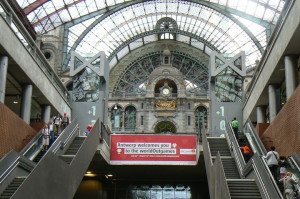 It was a familiar sign in a foreign place; familiar from the previous two Outgames (Montreal 2006; Copenhagen 2009). Now it was Belgium’s turn to sponsor one of the world’s biggest sporting events and an important gay human rights conference themed ‘From Safe Harbor to Equality’.
It was a familiar sign in a foreign place; familiar from the previous two Outgames (Montreal 2006; Copenhagen 2009). Now it was Belgium’s turn to sponsor one of the world’s biggest sporting events and an important gay human rights conference themed ‘From Safe Harbor to Equality’.
Outside the station collecting in pairs and groups I watched ‘obviously’ gay folks heading across the busy square among an assortment of fashionable mothers with strollers, a juggler, a strumming troubadour, a musical carousel, stalls selling chocolates and fruit; rainbow banners fluttered from the lamp posts. We rainbow warriors were here for the human rights conference that’s held three days before every Outgames. As usual the event was being attended by known and unknown rights advocates, some from the UN, some from deepest homophobic Africa, some from Cuba (Castro’s daughter), transgendered activists in low heels from Europe, South and Central America and India; most delegates came from Europe and North America.
I hugged a few people–David from Uganda, Rosanna from Sri Lanka, Jose from Mexico–whom I had interviewed over the years for my website. Others familiar faces were missing because they could not afford it and still a few others had died.
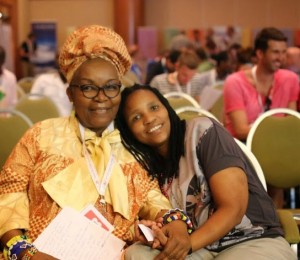 One of the conferees was Alice Nkom, a straight grandmother, LGBT activist and lawyer from Cameroon. (photo left) I had met her before at the Copenhagen OutGames conference in 2009. Alice was by far the most colorful figure in the conference with her flowing batik-pattern pagnes (gowns) with matching headdress wraps. Each day she wore a different pagnes which brightened the conference. She was a lot of woman to hug and I loved her embrace as I expressed my sympathies for her loss of her friend and fellow Cameroon activist Eric Lemembe; I could see her moist eyes behind her horn-rim glasses as we chatted quietly.
One of the conferees was Alice Nkom, a straight grandmother, LGBT activist and lawyer from Cameroon. (photo left) I had met her before at the Copenhagen OutGames conference in 2009. Alice was by far the most colorful figure in the conference with her flowing batik-pattern pagnes (gowns) with matching headdress wraps. Each day she wore a different pagnes which brightened the conference. She was a lot of woman to hug and I loved her embrace as I expressed my sympathies for her loss of her friend and fellow Cameroon activist Eric Lemembe; I could see her moist eyes behind her horn-rim glasses as we chatted quietly.
The OutGames Human Rights Conference: ‘From Safe Harbor to Equality’
The conference was held at the modern Radisson Hotel directly across the square from the train station. It presented dozens of speeches and seminars on many aspects of human and gay rights and the challenges we face from homophobic governments, religions and civil societies. We also heard about achievements gained from courts legalizing gay rights including gay marriage (Argentina), civil partnerships (Colombia) and the elimination bans on gays in the military (USA).
Alice was one of the first presenters. Before starting, she asked for a moment of silence for Eric Lemembe, (photo right) whose out visibility in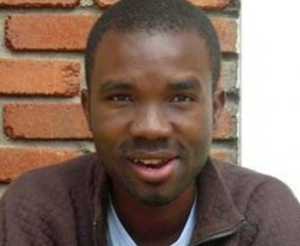 Cameroon’s cost him his life; he was brutally tortured and murdered in his home less than two weeks before Alice stood up to speak. Despite her sorrow she gave a heartfelt speech about the dangers LGBT Cameroonian citizens face against the intense homophobic hatred in that small country. The memory of Eric was fresh and poignant for everyone present that morning. The silence was heavy.
Cameroon’s cost him his life; he was brutally tortured and murdered in his home less than two weeks before Alice stood up to speak. Despite her sorrow she gave a heartfelt speech about the dangers LGBT Cameroonian citizens face against the intense homophobic hatred in that small country. The memory of Eric was fresh and poignant for everyone present that morning. The silence was heavy.
Soft-spoken but angry, Alice described the fearful atmosphere in Cameroon for LGBT people. As a rational well-educated professional she was deeply troubled by the irrational hostility that is on the rise. One of Alice’s fellow lawyers, Michel Togue, who also defends gays, has also seen this dangerous tide. Recently an anti-gay rally was held in central Yaounde, the capital, with banners and signs condemning homosexuality as destructive to Cameroon’s moral standards. In contrast, no one protested in public against Eric’s extremely immoral assassination.
In no uncertain terms Alice spoke to the conference saying that “religion is a plague” which contributes to the high level of hatred toward gays. Cameroon is about 70% Christian and 21% Muslim; both are well know to oppose homosexuality as a natural human attribute. “Anti-gay denunciation from the clergy of both belief systems encourages violence among poor, underemployed and undereducated young men whose lives are filled with resentment and who look for any scapegoat to blame for their daunting circumstances.” (Per capita income is about US$2000 per year, despite low unemployment).
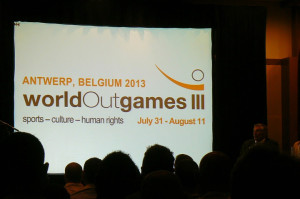 Alice said she fears for her safety. Her public work has put her own life at risk. She knows the Minister of Justice yet she cannot get guards to protect her. She and ADEFHO (Alternatives-Cameroun, Association for the Defense of Gays and Lesbians) have suffered threats, attacks, and intimidation. She herself has received death threats. She has been imprisoned and threatened with being disbarred by morally corrupt government officials but she displays no fear in the manner of a person who is convinced she serves a higher purpose of compassion for wrongly persecuted people. So she persists and repeatedly returns to court to defend mistreated citizens. http://www.womeninandbeyond.org/?p=6450#sthash.2fmXMwBH.dpuf
Alice said she fears for her safety. Her public work has put her own life at risk. She knows the Minister of Justice yet she cannot get guards to protect her. She and ADEFHO (Alternatives-Cameroun, Association for the Defense of Gays and Lesbians) have suffered threats, attacks, and intimidation. She herself has received death threats. She has been imprisoned and threatened with being disbarred by morally corrupt government officials but she displays no fear in the manner of a person who is convinced she serves a higher purpose of compassion for wrongly persecuted people. So she persists and repeatedly returns to court to defend mistreated citizens. http://www.womeninandbeyond.org/?p=6450#sthash.2fmXMwBH.dpuf
She continued, “women are not exempt from the homophobic hysteria and accusations. Last year, in February 2012, ten women were arrested merely on suspicion of being lesbians with no proof being offered–and no proof was needed for police to take action. Gossip and accusation was enough. Some men have been arrested and imprisoned for an unusual hair style or for drinking Bailey’s Irish Cream. These ‘crimes of fashion’ were considered sufficient evidence of the men being feminine and therefore gay. To highly charged gay-baiting thugs that evidence was proof enough that the queers should be incarcerated or at least be attacked.”
Against this storm of prejudice and violence Alice stands determined and strong. The audience rose to its feet on conclusion of her noble speech. Her eyes moistened as she humbly bowed to everyone for their understanding and support as they continued to applaud. She seemed to float off the stage in one of her “amazing technicolor dreamcoats”.
Personal Belgian Gay Life
Prior to the Games I checked in with my LGBT home-swapping service, HomeAroundTheWorld.com, which connects gay folks with homes to others interested in exchanging houses or rooms for vacation purposes. I sent e-mails to three Brussels members (there were no Antwerp members) of HATW and received one positive reply from a lawyer in the city. He said he could not do a simultaneous trade but he had a spare bedroom which I was welcome to have. We e-mailed details of the house and its location in Brussels. Although the OutGames and Human Rights Conference were in Antwerp about 45 kms (27 mi) from Brussels Henri assured me there was no problem commuting back and forth: a fifteen minute local tram to the train station and a speedy thirty minute inter-city train between cities. Public transportation in Belgium is very efficient and frequent.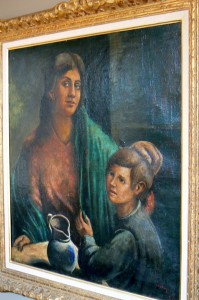
When I arrived at his yellow brick house I was surprised at its size and elegance; it was on the fringe of upper-class, not a palace, more like a mansion. Three floors, three bedrooms en suite with a bathrooms, a huge living room, a study, a city-view roof deck. The furniture was designer chic modern mixed with valuable antiques and original 20th century paintings hanging in each room. (photo right) The bedroom walls were upholstered and the wall-to-wall carpeting had bright purple squares-on-white background. Very stylish. Through a curved glass door and down a curved stairway was the large eat-in kitchen on the ground floor with a ten-foot ceiling and furnished with high-end stainless-steel appliances.
Henri was in his late forties, lean (from daily gym visits), short cropped gray hair and was a cordial gentleman, a lawyer for the European Commission headquartered in Brussels. He had purchased the house about eight years ago in worn condition. With his boyfriend, decorator and contractor the place was brought back to elegant life. As he showed me the house he was soft-spoken, rather shy but articulate and thoughtful. There were two bicycles in the garage–along with piled-high with unused antique furniture purchased by his boyfriend which, from the looks of it all, seemed to have been untouched for a couple of years. The garage was available for storage because Henri did not own a car since city transportation was so close and convenient.
I was pleased with Henri, the house and my luck in finding them both. We would only see each other on some evenings since he left for work early and returned only sometimes for dinner at home, if he was not eating out with friends. My room usually doubled as a study-library with built-in shelves filled with literature and legal books. In the middle of the room was a beautiful wood-inlay 18th century Louis XV desk with golden metal detailing and drawer pulls. I felt right at home–fit for a queen!
The next morning I asked Henri if I could borrow a bike to ride to the train station. He was agreeable to that so I had a pleasant circuitous peddling around one area of Brussels, which has great variety of architecture from Gothic to Bauhaus. I parked and locked the bike at the station. Precisely on time the train arrived, highly decorated with graffiti figures and symbols; it’s hard to protect a thousand trains from the spray-can ‘artists’ in the countryside and cities.
When I returned to the train station that evening my bicycle was gone; stolen on my first day. Not a great way to start off my visit in historic Belgium home to one of the world’s most humanistic organizations, the European Commission whose members swear an oath at the European Court of Justice to respect the ethics and integrity of the European Union toward a better world. But Henri did not seem to mind the loss. He hardly ever used the bikes, one of which belonged to his boyfriend–who was in the process of becoming his ex.
He and his partner of 12 years, Philippe, had been “separated” for the past year. Not surprising, the break had to do with a loss of compatibility between their personalities. I did not meet Philippe. Despite a very comfortable upscale house with three floors of luxury goods, the two partners were living apart. The loss of harmony had led Philippe to move out. As is often the case, the abandoned one, Henri, still hoped to reconcile and continue as before but he was unfortunately short-sighted and naive that they could go back to the good old days when they enjoyed each each other’s company. Some relationships wear thin over time and many wear out. He did not like being reminded of that but understood the truth of it.
He needed to talk and we had several conversations, initiated by both of us. In so many words I said compatibility is difficult to make happen. It is a chemistry between people that depends on subtle signals, attitudes, values, emotional moods, personal habits as well as the many intricate and noticeable interactions of everyday domestic life. It’s a context that two partners weave together over time; some couples sustain it for fifty years while others can’t make it at all or stick together because of sexual attraction, until that wears out. It was obvious that Henri was still sexually attracted to Philippe although they were not compatible–a difficult tension. Philippe had let Henri know he was finished and wanted his “freedom”. Henri could not say what that meant. It seemed both men were not very articulate at expressing feelings. The relationship had become strained, brittle and fallen apart.
But Henri was not ready to let go of Philippe despite a year of separation with only occasional contact. My impression of Philippe was that he is an immature guy who at 43 preferred to live with his parents (who supported him) and had no substantial career. Henri on the other hand was a highly functioning lawyer with financial means (he had bought the house, furnishings and art pieces) and had independent loving relationships with his family. The difference and distinction between them was evident to me, as a psychologist, but it was a co-dependent blind spot for Henri. But since we were only new acquaintances and Henri was not asking for ‘help’ I did not push the issue much further than a preliminary opinion. He said other older friends were urging him to let go of Philippe so I left Henri in their hands.
LGBTs in Belgium
Gay life in Belgium is book-ended on one side by the rowdy, brash colors and noise of the annual gay Pride Parade and on the other side by the silent anguish of two separating gay partners. These were two contrasts of experience I saw during two weeks in Brussels and Antwerp–cities of diamonds, immigrants and chocolate–where in addition to the OutGames and Human Rights Conference I traveled beyond to green pastures and the historic towns of Ypres and Brugge.
Belgium is a small country that historically brought together diverse people from all kinds of ethnic, cultural and religious backgrounds to conduct their lives and commerce. Spices from the far east, exotic wood from South America, flowers from Holland and linen from central Asia. For hundreds of years this mix was competitively governed by Hanseatic laws that imposed order, structure and equality among citizens and foreigners. (photo right: cathedral and statue of the painter Rubens)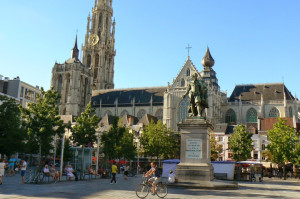
That attitude of fairness and respect has been one of the contributing factors that led to modern Flemish and Dutch attitudes toward ‘different’ people including LGBT folks. Homosexuality has been legal in next-door Holland since 1811. Before that sodomy was a crime thanks to the protestant religious influence, which had to compete with commercial interests of the people. Napoleonic Laws tolerated homosexuality when the countries were French possessions. Not surprising, these two countries were the first in the world to allow same-sex marriage–not that the trajectory of progress has not been smooth. In the modern era, the invading Nazis criminalized homosexuality but almost immediately after the war the Belgians returned to their liberal attitudes.
Since then there are and have been conservative anti-gay political voices along the way. There was more than a little grumbling when (former) openly gay Prime Minister of Belgium (Elio Di Rupo, from 6 December 2011 to 11 October 2014) won that position. Nevertheless the conflicted mess in the capitol building does not much impinge on everyday life.
Belgium is a member of the European Union which has codes of conduct for member states, one of which is non-discrimination against LGBT citizens. Since these codes are not laws they are sometimes ignored by eastern bloc countries that still tolerate high levels of homophobia, such as in Bulgaria, Lithuania and Croatia. But Belgium does have in place numerous pro-gay rights and protections such as marriage, adoption, equal age of consent, and anti-discrimination in the workplace and military. Culture wars still thrive between eastern and western Europe.
However, since most LGBT people do not live their lives at the political or legalistic level their focus is much more personal such as safety in public places, tolerance at work and by neighbors, safe meeting places–bars, clubs, restaurants–and probably most importantly privacy in which to conduct relationships and family matters of their choice. A safe home is a universal need and Belgians understand this should be for all. This is reflected in the daily routines of most people in the reliable public transportation, cleanliness in the streets, world-class food availability, integrity of personal property and respect for relationship style. No one is looking for trouble unless they are criminally minded and then the police step in quickly.
So two men or two women who rent or own a home are not likely to be the target of homophobic slander or attacks. There have been occasional incidents involving immigrants or individual or groups from Muslim or African origins who cannot accept same-sex relationships and will speak slurs or spray anti-gay graffiti slogans. But this is unusual and such an offender will also run afoul of the law.
As a result there are numerous LGBT venues in major Belgian cities that are visible and open and comfortably sport a rainbow flag out front. The gay guide to Belgium lists dozens of gathering places in Brussels, Antwerp, Ghent, Brugge where LGBT people congregate to drink, dance or hook up any day or night of the week–when they are not using social media to do it online.
Not So Harmonious
The political fabric of Belgium is often shredded. This small country that was devastated by the Germans (and their Allied opponents) twice in the 20th century is today beautifully restored but is aggravated by their own internal attitudes and opinions. There are three distinct language sectors: Dutch/Flemish in the north, French in the south and German in the east. The most distinct division is between the Flemish north and French south where resentment runs from high (among conservative separatists) to low (among most working class citizens who speak French).
This division in loyalties and power politics led to a chaotic and fragmented 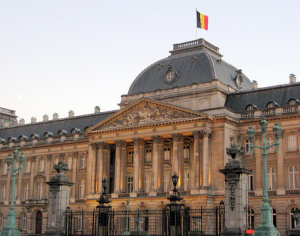 confrontation following the national election in 2010 when no one party gained a clear majority. For over a year (540 days) there was a conflicted stand-off between major parties as they jockeyed for dominance, so there was no designated central government in place. Finally in 2011 a coalition of six parties united together and elected Elio Di Rupo to lead a government, ending nearly a year and a half of post-election brinksmanship between the parties. Since then another election resulted in Charles Michel as PM. One person told me in Brussels (the south) that Flanders and the north “feel like a different country”. Such are the fracture lines in this small country. (photo right: capitol building)
confrontation following the national election in 2010 when no one party gained a clear majority. For over a year (540 days) there was a conflicted stand-off between major parties as they jockeyed for dominance, so there was no designated central government in place. Finally in 2011 a coalition of six parties united together and elected Elio Di Rupo to lead a government, ending nearly a year and a half of post-election brinksmanship between the parties. Since then another election resulted in Charles Michel as PM. One person told me in Brussels (the south) that Flanders and the north “feel like a different country”. Such are the fracture lines in this small country. (photo right: capitol building)
However, as I have seen elsewhere in the world, these political separations diminish when it comes to the LGBT world. What often emerges instead of competitive hostility and entrenched political ideologies is an unspoken common bond of understanding that arises from our union of being ‘other’. A bond of connection and appreciation of our sexuality seems stronger and more important than partisan politics.
This is not unlike different communal minority groups who find camaraderie in their own familiar ranks and neighborhoods. Roma, transgenders, Amish, Jews, or Flemish–any geographic or nationalist or religious minority. LGBT politics are not as venomous or hostile among our leaders. Shared history, friendship values, lifestyle commonalities, language usage, love partners, respect for sexual practices, significance of gay marriage and campy humor–all these cut across typical political lines to create a more cohesive community. The OutGames Human Rights Conference demonstrated this common ethos as more than a thousand delegates from a hundred countries gathered in harmony to appreciate differences, sympathize with defeats and support achievements.
The OutGames 2013
Every four years a few thousand LGBT folks gather to display their athletic prowess at the OutGames (and Gay Games on alternative years) to make a statement of Pride in various gay-friendly cities around the world–mostly in Europe and North America. This time it was the ancient maritime city of Antwerp on the North Sea, a place that has been the seat of cultural and economic exchange ever since boats were invented to carry goods to foreign ports.
The OutGames sports events went well for the week (August 1-9). There were about 32 sports with 7000 athletes from 100 countries–fewer than the preceding Gay Games but still a hearty milieu that mixed competition with game-playing. From the graceful ballroom dancing (now called Dancesport) to archery to bowling, rowing, track and field; it all happened across dozens of venues in Antwerp. There was also petanque, a sort of lawn bowling, chess, martial arts (such as Israeli krav maga, Thai kick boxing and Brazilian jui-jitsu), country western dancing (in boots), inline speed skating (in August!), and, at my own venue, swimming, water polo and synchronized swimming that’s like water ballet. (video: https://www.youtube.com/watch?v=gEsgiF40PIc#t=150).
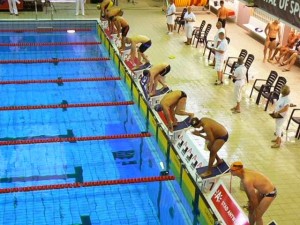 I competed in swimming so I spent much the week in the Wesenberg Aquatic Center with its 50 meter-long pool (165 feet one way!). As a participant of one sport it’s difficult to see other sports because of scheduling. There were swim races all day everyday. On my days off I toured Brussels, Antwerp and other major historic cities outside Antwerp. (See Belgium photo galleries.)
I competed in swimming so I spent much the week in the Wesenberg Aquatic Center with its 50 meter-long pool (165 feet one way!). As a participant of one sport it’s difficult to see other sports because of scheduling. There were swim races all day everyday. On my days off I toured Brussels, Antwerp and other major historic cities outside Antwerp. (See Belgium photo galleries.)
I have swum most of my life because I can’t dribble, hit or kick a ball or run fast. It is a soft sport with no impact on my aging joints. The medium of water is soft and soothing; it suspends me in a different reality that is both pleasant and risky. In college and graduate school I swam on teams with much faster guys. I never had a top-notch trainer and did not learn how to speed through the water and remained a moderate yet reliable water baby at four different universities. I often think my interest in competitive swimming was inspired by my first college where the team worked out nude!
Lesbian Swimmer
At the OutGames while waiting for my longest race (200 meter individual medley–one length of each of the four strokes: fly, back, breast, free) on day two at the pool I asked a pert young woman named Heidi, svelte in her black Speedo, to take a video of my race. I showed her how to use my camera and I now have a video of the event. Afterwards she and I fell into conversation about her coming out. Heidi was born and raised in Antwerp. Her first awareness of being a lesbian came in the 7th grade when she has a crush on her teacher. She was confused and pleased but did not say anything to her parents until high school. Actually her mother first mentioned it since she appeared to show no interest in boys.
Finally admitting her truth neither parent was surprised but being lifelong heterosexuals they did not understand homosexuality so they went to a therapist for some guidance. Heidi still laughs at this unusual response. Reassured they did nothing wrong in child rearing her folks have become two of her best friends and welcome Heidi’s gay friends and her partner of 4 years.
Final Days
The opening and closing ceremonies were colorful and noisy events with speeches and music but they were overall modest compared to previous OutGames in Montreal and Cologne. They were held outdoors in an empty space next the harbor. The most entertaining event was the mile-long Antwerp Gay Pride Parade that happened the same day as the closing ceremony. The parade offered more varied entertainment along a main street in central city also by the harbor with a thousand marchers in usual outlandish costumes and outlandish lack of costumes.
There were truckload contingents of clubs, pubs and discos with guys in short shorts, 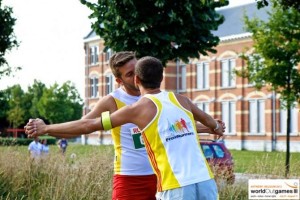 OutGames athletes, Oslo cheerleaders, women with kids, Antwerp police corps, drag queens in sequins and boas, a bear cage on wheels, free HIV testing clinics, LGBT websites like gay.eu and countless people just waking along in the fun.
OutGames athletes, Oslo cheerleaders, women with kids, Antwerp police corps, drag queens in sequins and boas, a bear cage on wheels, free HIV testing clinics, LGBT websites like gay.eu and countless people just waking along in the fun.
Beyond the colors and sounds there was a big kiss-in staged in front of the Russian consulate to protest the recent anti-gay laws and homophobia in Moscow. (Numerous videos of that celebration can be seen on You Tube). Nothing escapes the fashion or satire of a gay parade.
The week was inspiring, playful, poignant, important and historic. I would do it again.
















